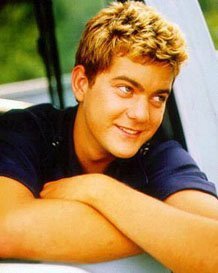Getting in touch with your inner teen (part 2)
Have been meaning to follow up Getting in touch with your inner teen for a while now.
This time: TV shows. Ah, yes – a legitimate excuse to watch television. Because it's research.
I have two personal favourite recommendations, TV-wise. One is Buffy the Vampire Slayer, especially seasons one to three (though there is some good stuff later on). Teenage angst, but with monsters. Having a whole secret identity that teachers and parents don't understand or respect, or a boyfriend who goes evil after you sleep with him… oh, it is so good. With super, if quirky, dialogue.
The other is Dawson's Creek. As with Buffy, there is terrific dialogue. In this case, it's terrific, over-thinking, over-analysing-everything dialogue. But there's also that hovering between grown-up and kid, the sulk-fest one moment and adolescent sex-obsession the next. And there is Pacey Witter.
Both of these are from the late 90s/early 00s, during which time there were also things like Roswell (teen angst! With aliens!), Felicity (she cut her haaaaaaaair!), Popular (demented yet brilliant), Freaks and Geeks (tragically short-lived). I am fond of this post-My So-Called Life era of TV, I must say. The noughties went on to bring us Gilmore Girls (possibly more family drama than teen show, but shh. Rory! Paris! Lane!) and Veronica Mars (girl detective! Darkness! Epic amounts of angst and betrayal!), and then the glamour-heavy worlds of The O.C. and Gossip Girl. And of course the high-school-drama-meets-musical fest that is Glee.
The trouble with watching teen-centric TV as research is that you need to know how interpret it. Characters in books, like characters in TV shows, have lives that tend to be slightly more dramatic and polished and scripted than real-life people. But TV shows also tend towards characters acting and seeming much older than they are (in large part because the actors playing them tend to be older), in a way that happens much more in TV than in books. And everyone is good-looking, really really ridiculously good-looking – even the 'plain' kids are stunning. And almost always thin or muscular, depending on gender. And have many, many different outfits and spacious living quarters, even if these things are only shown and not discussed.
On the plus side, though, teen-centric TV does a lot of the same thing that teen-centric books do. It takes various situations teen characters might find themselves in, ranging from probable to implausible, and mines them for all the drama (and romance, and comedy) they're worth. And if it does it right, it persuades viewers to care deeply about what happens with the teen characters and the choices they make, to take them seriously or to empathise somehow. Teen-centric things aren't the only things that ask us to do this, of course, but books and TV aimed at adults often has teen characters acting in a way that invites exasperation or amusement rather than identification. The 'oh to be young and know everything!' sort of vibe.
So, legitimate research? Absolutely. And not just a reason to gaze adoringly at Joshua Jackson or David Boreanaz in their 20something primes. Nope. Certainly not.



